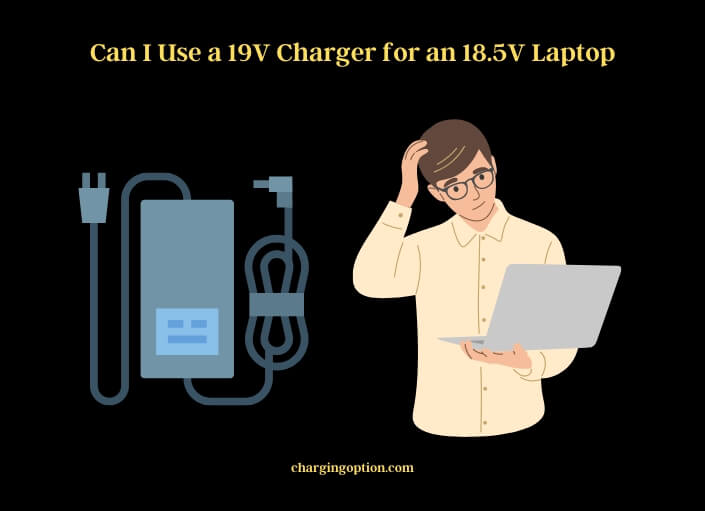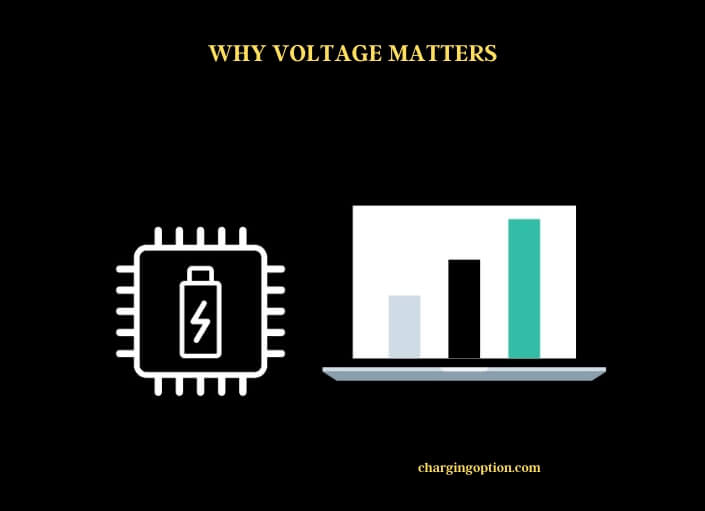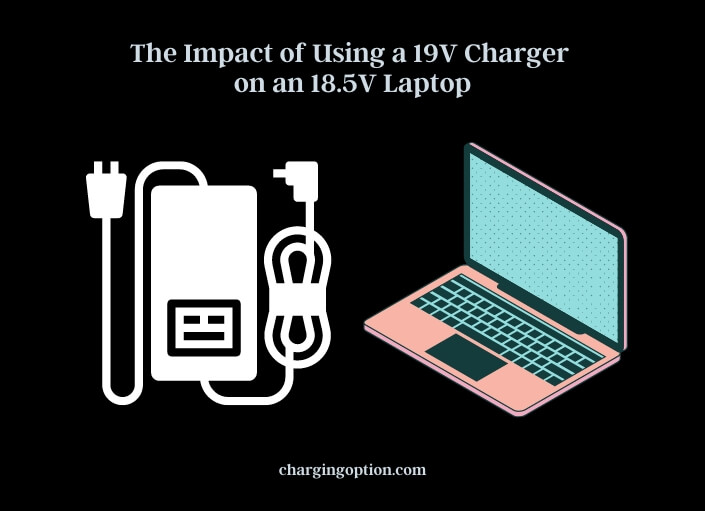Welcome to this in-depth guide where we pull back the curtains on the somewhat mystifying world of laptop charging. It’s a question that has likely crossed your mind, or you wouldn’t be here: “Can I use a 19V charger for an 18.5V laptop?”

Can I Use a 19V Charger for an 18.5V Laptop?
This might seem like a simple yes or no question, but there’s a bit more to it. In essence, using a 19V charger for an 18.5V laptop isn’t necessarily harmful. Laptops typically have a voltage tolerance of about +/- 5%. However, it’s not something that’s generally recommended as it can potentially reduce the lifespan of your laptop’s battery over time.
Voltage and Laptop Chargers
In order to fully appreciate the potential issues of using a 19V charger on an 18.5V laptop, it’s essential to understand what voltage is. Voltage is a measure of the force of electricity moving through a circuit – think of it as the water pressure in your home’s plumbing. It needs to be just right – not too high and not too low – for your appliances to work correctly.
Why Voltage Matters
Voltage is critical because it determines how much power is supplied to your laptop. Too little voltage, and your laptop won’t function as it should. Too much, and you risk damaging the internal components or overheating the battery.

The Voltage Sweet Spot
Most laptops are designed to work within a certain voltage range. For instance, an 18.5V laptop can typically handle a little more or less voltage. Continuously subjecting your laptop to higher than specified voltage can result in a shorter battery lifespan. Learn more, you can see this video:
The Impact of Using a 19V Charger on an 18.5V Laptop
While using a 19V charger for an 18.5V laptop is not likely to cause immediate catastrophic damage, it may have more subtle effects. Here’s what might happen over time:
Decreased Battery Lifespan
Continually overvolting your laptop battery can decrease its lifespan. This means you’ll find yourself needing to replace the battery sooner than expected, an avoidable expense.

Increased Heat Production
Overvolting can also lead to increased heat production, which is not good news for any of the internal components of your laptop. Over time, this heat can cause wear and tear, leading to potential component failure.
Making the Right Charger Choice
Choosing the right charger for your laptop is critical. It’s not just about the voltage; you need to consider the charger’s power output, the size of the connector, and the quality of the charger itself.
Matching the Voltage and Power Output
While there’s a little leeway with voltage, it’s crucial to ensure that your charger’s power output (measured in Watts) matches your laptop’s requirements. This is calculated by multiplying the voltage by the current, measured in amperes.
The Importance of a Good Fit
The physical connector of the charger should also be a perfect fit for your laptop. An ill-f itting connector can lead to a poor connection, causing charging issues and potentially damaging the laptop’s charging port over time.
The Pitfalls of Cheap Chargers
Cutting corners by buying a cheap, non-branded charger can come with its own set of problems. Not only can they pose a fire risk due to substandard components and lack of safety features, but they may also not deliver the correct voltage or power output for your laptop.
Safety First
It’s always advisable to use chargers that have passed stringent safety standards. These come with fail-safes like over-voltage, over-current, and over-temperature protection, safeguarding your laptop and you.
Universal Chargers – A Viable Option?
Universal chargers can be a tempting solution, given their wide range of voltage settings and interchangeable connectors. They might look like a one-size-fits-all solution, but are they really safe and efficient for your laptop?
Pros and Cons of Universal Chargers
Universal chargers offer flexibility and can be a handy backup or travel charger. However, they might not deliver the most efficient charging for your laptop and, in some cases, might even harm your device if not used correctly.
OEM Chargers – The Gold Standard
Original Equipment Manufacturer (OEM) chargers are undoubtedly the best option for your laptop. They are designed specifically for your device’s needs, ensuring optimum charging performance and longevity.
Why OEM is the Way to Go
OEM chargers may come with a higher price tag, but they guarantee the correct voltage, power output, and perfect connector fit. Moreover, they meet the highest safety standards, providing you with peace of mind.
FAQs
Will using a 19V charger damage my 18.5V laptop immediately?
Using a slightly higher voltage charger, like a 19V charger for an 18.5V laptop, usually won’t cause immediate damage. However, it’s not recommended as it can potentially decrease your laptop’s battery lifespan over time.
How much voltage variance can a laptop tolerate?
Most laptops can handle a voltage variance of about +/- 5%. So, if your laptop requires 18.5V, it should generally be safe to use a charger within the range of 17.575V to 19.425V.
Are universal chargers safe to use with my laptop?
While universal chargers provide flexibility by being compatible with multiple devices, they should be used with caution. Always ensure that the voltage and power output of the universal charger match your laptop’s requirements to avoid potential damage.
Can I use a lower voltage charger for my laptop?
It is not advisable to use a lower voltage charger for your laptop. A charger with lower voltage may not provide enough power, causing your laptop to underperform or not charge at all. It’s best to use a charger with the voltage specified by the laptop manufacturer.
Why should I choose an OEM charger over a cheaper alternative?
Opting for an Original Equipment Manufacturer (OEM) charger is recommended because it is specifically designed for your laptop model. OEM chargers ensure optimal performance, longevity, and safety for your laptop, reducing the risk of potential issues that cheaper alternatives may pose.
What damage can overvolting cause to my laptop?
Overvolting, supplying higher voltage than recommended, can have several negative effects on your laptop. It can lead to a decreased battery lifespan, increased heat production, and potentially cause damage to internal components. It’s crucial to use a charger that matches your laptop’s voltage requirements to avoid these risks.
Conclusion
In a nutshell, while you can use a 19V charger for an 18.5V laptop, it’s not the best practice. It could potentially lead to decreased battery life and increased heat output. For the best performance and longevity of your device, stick with the manufacturer’s recommended charger or a high-quality alternative that meets your laptop’s voltage and power output requirements.
Read more:
